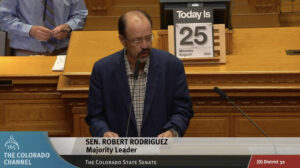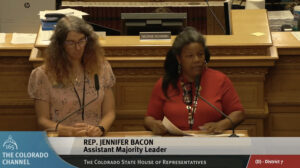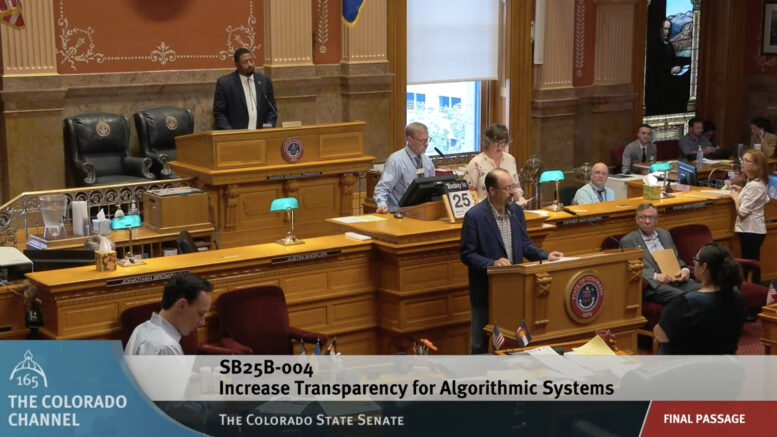Facing industry and public-entity backlash over a potentially job-stunting liability clause in the latest try at artificial-intelligence regulatory overhaul, backers agreed instead Monday to delay launch of Colorado’s precedent-setting rules to allow more time for a potential fix.
That massive change to Senate Bill 4 capped a whirlwind five days in which sponsors told colleagues they reached an agreement to pass new consumer protections and regulatory rollbacks, only to have business and tech-industry leaders quash the deal with opposition. Seeing no path to passage in the Colorado Senate, sponsors then agreed to bump back the implementation of the existing regulatory structure from Feb. 1 to June 30, in hopes that they can negotiate workable rules for the industry before the end of the 2026 legislative session.
With the change of SB 4 to a simple implementation delay, it sailed through the Senate on a 32-2 final vote — albeit with the consternation of some original supporters — and then got preliminary approval in the House despite more significant opposition to the amendment. It is expected to pass the House on Tuesday and bring to an end a six-day special session that focused largely on partially closing a $783 million budget shortfall but that generated the most intense debate over how the state should try to stop potential AI discrimination.
What led to the gutting of the AI regulatory bill

Colorado Senate Majority Leader Robert Rodriguez speaks in that chamber Monday.
Senate Majority Leader Robert Rodriguez authored the precedent-setting 2024 regulatory law that required developers and deployers of AI systems to guard against potential algorithmic discrimination and offer disclosures of how such discrimination could occur. But the Denver Democrat has worked since then to replace some of its most demanding provisions, including a bulky appeals process for consumers impacted by consequential AI-generated decisions and lengthy disclosures required of developers and deployers.
Rodriguez said repeatedly that he was not happy Gov. Jared Polis put AI regulation in his call for the special session, which largely focused on attempts to offset revenue losses stemming from tax breaks in the federal “One Big Beautiful Bill.” But he came up with what he called a stepped-down regulatory approach in SB 4 that still would have required AI developers and deployers to explain why algorithms may have nixed someone from getting a job interview or insurance coverage for a medical procedure.
Even after making several changes to proposed disclosures in recent days, Rodriguez found himself awash in complaints for an amendment to SB 4 that he introduced late Sunday that would have created joint and several liability implicating both developers and deployers. Tech-industry leaders warned that the change, which would have removed safe-harbor language from the original bill, would have caused a rush of AI development out of Colorado to other states, as no other jurisdiction the U.S. has such a liability provision.
Delay viewed as best option left

Senate Majority Leader Robert Rodriguez questions a panel of tech-industry leaders skeptical of his AI regulatory proposal during a committee hearing Thursday.
Facing likely defeat of SB 4, Rodriguez rewrote the bill as one simply delaying enforcement of his 2024 law — a change that leaves that much-bemoaned law in place but gives industry and consumer advocates 10 months to come to a so-far elusive compromise. He then defended the principles of SB 4 — requirements for meaningful disclosures backed by liability when Coloradans are harmed by AI decisions — in a floor speech Monday but said the longer negotiation runway represents the best path toward consensus.
“I have seen this building come apart at the seams not once, twice, but now three times over this policy fight,” Rodriguez said, referencing the previous fights over the original 2024 law and over his failed attempt at reform during the 2025 regular session. “At the end of the day, we must ask ourselves: Why does policy matter? What is at stake? Should a company whose AI system determines who gets hired and promoted, how much tenants pay for rent and who receives medical care ever be held to account?”
The rewriting of SB 4 as an implementation delay brought praise from business and technology groups, as well as from organizations of school board and school executives who said they could not afford to comply with the new law by February. Jonathan Singer, senior director of policy programs for the Boulder Chamber, said he had talked with businesses that are pausing expansions, considering out-of-state moves and rethinking planned relocations to Colorado until the existing regulations are eased.
Opinion divided over major change
“Changes certain groups were seeking would have made Colorado the only state in the country with a liability system that would result in higher legal risks for all businesses, fewer opportunities for AI development and serious harm to Colorado’s business climate and competitiveness,” Colorado Chamber of Commerce President/CEO Loren Furman said of the previous amendment effort. “We thank Sen. Rodriguez for amending his bill and allowing Colorado businesses more time to work on the current AI law instead of pushing bad policy through a rushed special-session process.”
But it brought heavy criticism from more progressive Democrats in the House, who complained that Big Tech had used its influence and deep pockets to squash SB 4 and to win more time to try to undo substantial protections in the original law. And the changes caused Rep. Brianna Titone, the Arvada Democrat who sponsored both the 2024 law and SB 4 with Rodriguez, to pull her name off this bill in frustration.

Colorado state Reps. Brianna Titone and Jennifer Bacon, the original sponsors of Senate Bill 4 in their chamber, speak about changes to the proposal on the House Floor Monday night.
“We wanted to make sure we were giving citizens the chance to be able to fight back against the big tech companies … And we had what I felt — and what many of us in the coalition felt — was a good policy, something that we could be proud of,” Titone said before the revised bill passed late Monday out of the House Appropriations Committee. “And that all went sideways when a lot of the tech companies said, ‘Liability for us is the non-starter.’ … They didn’t want to be responsible for the products that they make. And that should be alarming to everybody.”
Delay in AI law “buys us that time” to find consensus
Some Democrats from both chambers jumped in to defend the change, noting that the implementation delay was shorter than what was proposed by the competing House Bill 1008, which wanted to push the new rules out to October. Rep. Cecelia Espinoza of Denver said the pause will allow more legislators to get actively involved in crafting compromise legislation, while Sen. Jeff Bridges of Greenwood Village said he saw more progress in the past 2-1/2 days of talks than he’d seen in the past 2-1/2 years.

Colorado state Sen. Jeff Bridges speaks about the AI regulatory bill in his chamber on Monday.
“There are folks involved in this that have taken Colorado’s first-in-the-country law and worked really hard to find a path forward,” Bridges said. “We can get this done. This delay buys us that time.”
Rodriguez, who chaired a task force after the 2024 session that sought to find compromise, didn’t say exactly what the next steps toward developing a consensus bill could be. But talks are expected to resume not long after Tuesday’s expected adjournment of the special session, which would give the different parties more than four months to talk before the next regular session gets underway on Jan. 14.
